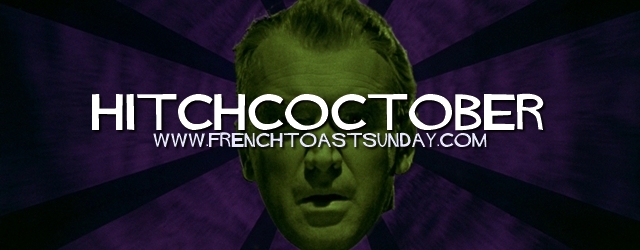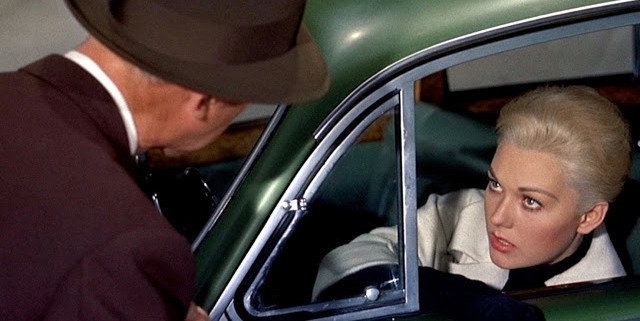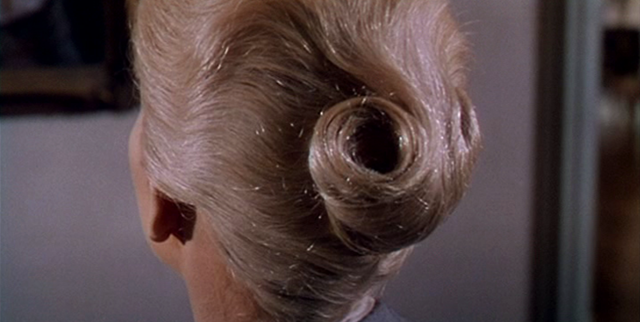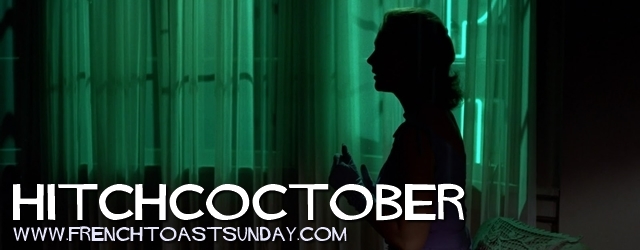
Trope Talk is my way of dishing out and breaking down the timeless and the tiresome of cinema’s most recognizable tropes, archetypes and formulas. This month, I’ll be exploring how tropes can sometimes lead to certain expectations— expectations which are not met when a film comes along that doesn’t quite fit into the pattern like we think it should. Alfred Hitchcock’s Vertigo (1958) was such a film for me— a masterpiece, but not what I expected.
I haven’t seen all of Hitchcock’s films, but most of the ones I have seen so far find terror through suspense— Psycho (1960) is a horror classic, Rear Window (1954) twisted my psyche into tightly wound knots, and Strangers on a Train (1951) is a conceptually disturbing (but brilliant) and exquisitely composed film. Maybe it was the shower scene, the sense of claustrophobia, or that canted carousel shot from these respective films that made me expect something different—not necessarily better, just different—from Vertigo as someone looking back on Hitchcock’s work, out of order and out of temporal context.
My expectations were high because Vertigo is considered by some to be the best film of all time, even better than Citizen Kane. At any rate, many consider it to be Hitchcock’s best, most mature film. More than anything, though, I simply expected something different. I was expecting more suspense, more terror, even though this film preceded Psycho by two years. Vertigo really is a mature film— it’s beautiful and haunting.
But Hitchcock’s other films I’d seen were all those things and more— they were also visceral and full of tension and suspense that was palpable. Those films may have taken root in our minds but the mounting fear always extended outward, down our spines and into our stomachs, manifesting in goosebumps and white knuckles. Vertigo, for me, lacked all that; Vertigo remained a film of the mind, a psychological thriller that never managed to thrill the terror receptors of my soul in the same way those other films had.
I know this is reading like an unpopular opinion— maybe Vertigo is Hitchcock’s best work, and I’m not in a place to judge that adequately. What I do feel confident in arguing, though, is that it is not his scariest. And that is how tropes tripped me up. When I heard it was his best, I expected it to be his scariest, because I have been conditioned to believe that Hitchcock was a master of horror. Even in the small segment of his repertoire that I’ve seen, the truth was in the tropes, or so I thought— Hitchcock made films that were eloquent and intelligent and genuinely scary.
Vertigo lived up to its hype as a classic piece of cinema history, but it let me down as a Hitchockian horror film. And maybe that was partly due to my own naivete, but I blame it also on our reliance on tropes, especially with regard to classic cinema. With this very post, I am perhaps posing a counter-argument to every other post I’ve ever written on the topic. I merely think that sometimes, especially where directors are concerned, we shouldn’t be so myopic and blindly dependent when it comes to tropes. Tropes may serve as inaccurate markers by which we’ll come to unfairly judge other films. Tropes can and should be tested, tweaked, even thrown out from time to time. With Vertigo, Hitchcock remained true to his form as a director while also stepping ever so slightly away from the already unique horror brand he was cultivating. Sometimes, all it takes is that slight step away to make us rethink preexisting brands, be it in a genre or in the filmography of a given director. It might give you viewing-vertigo at first, but ultimately I think it’s a really important awakening to have.



